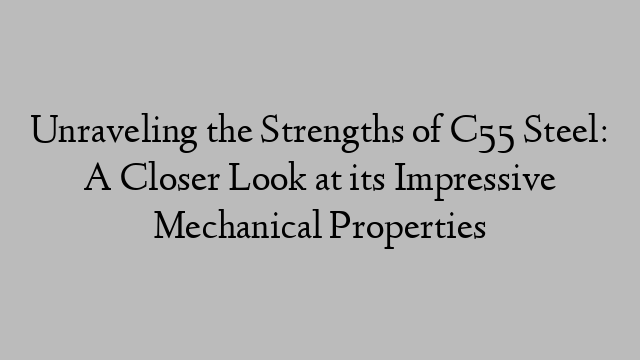Address
304 North Cardinal St.
Dorchester Center, MA 02124
Work Hours
Monday to Friday: 7AM - 7PM
Weekend: 10AM - 5PM
Address
304 North Cardinal St.
Dorchester Center, MA 02124
Work Hours
Monday to Friday: 7AM - 7PM
Weekend: 10AM - 5PM

Introduction:
C55 steel is a medium carbon structural steel known for its impressive mechanical properties. Throughout this study, we will delve deeper into the strengths of C55 steel, focusing on its mechanical properties and chemical composition. By understanding these aspects, we aim to provide valuable insights into the potential applications and advantages of C55 steel in various industries.
Mechanical Properties of C55 Steel:
1. Tensile Strength: C55 steel exhibits a high tensile strength, making it suitable for applications that require materials capable of withstanding high forces and loads. It has a tensile strength ranging from 700 MPa to 850 MPa, depending on its heat treatment and manufacturing processes.
2. Yield Strength: The yield strength of C55 steel is typically around 620 MPa. This indicates the stress level at which the material begins to deform permanently, making it an important property for evaluating its stability and structural integrity.
3. Hardness: C55 steel possesses excellent hardness properties, typically ranging from 170 to 210 HB (Brinell hardness). Its high hardness makes it resistant to wear and abrasion, thus making it suitable for applications in industries such as automotive, machinery, and tooling.
4. Impact Toughness: C55 steel exhibits good impact toughness, enabling it to absorb energy without shattering or fracturing. This property makes it suitable for applications where the material needs to withstand sudden or repetitive impacts, such as in the construction industry.
5. Fatigue Strength: C55 steel has good fatigue strength, meaning it can endure repeated cycles of stress and strain without failing. This makes it suitable for structural components subjected to cyclic loading, such as springs, fasteners, and gears.
Chemical Composition of C55 Steel:
The chemical composition of C55 steel plays a crucial role in determining its mechanical properties. The composition typically consists of the following elements:
1. Carbon (C): C55 steel is classified as a medium carbon steel due to its carbon content ranging from 0.52% to 0.60%. The carbon content primarily influences the hardness, strength, and machinability of the steel.
2. Silicon (Si): Silicon is often present in C55 steel in trace amounts, usually below 0.40%. It helps improve the strength and resistance to oxidation of the steel.
3. Manganese (Mn): C55 steel contains manganese in the range of 0.60% to 1.60%. Manganese enhances the hardenability and tensile strength of the steel, promoting its overall mechanical properties.
4. Phosphorus (P) and Sulfur (S): These elements are present in small amounts, usually below 0.040% each. They are controlled to ensure favorable machinability and avoid detrimental effects on the material’s properties.
Conclusion:
In conclusion, C55 steel exhibits impressive mechanical properties, including high tensile and yield strength, good hardness, impact toughness, and fatigue strength. These properties make it suitable for a wide range of applications in industries where strength, durability, and resistance to wear are crucial. Furthermore, the chemical composition of C55 steel, comprising carbon, silicon, manganese, phosphorus, and sulfur, plays a significant role in determining its mechanical properties. Understanding and harnessing these strengths can lead to innovative and efficient designs utilizing C55 steel in various engineering and manufacturing applications.
C55 Steel grade
1698523607